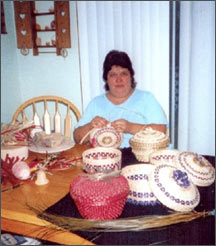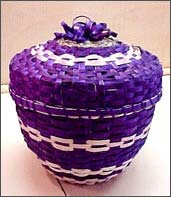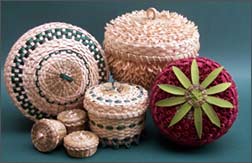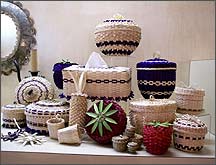Home
About Us
Current News
Event Calendar
Artist Bios
ARCHIVES
Display IDEAS
Collecting Tips
Gen Arts/Crafts Info
Testimonials
Hours/Directions
Online Store
Artist Bio: Robin Lazore Mohawk

Robin Lazore, a Mohawk from the Akwesasne Reservation, has been weaving baskets for over 20 years. Using the plaiting technique of basket weaving, Robin uses split ash and sweetgrass as materials, creating a variety of sizes and shapes. She is known for her strawberry and pineapple twist baskets, peace belt designs and colorful decorative patterns. She also created a tissue box basket called “The Tears and Peace Basket” to represent support for the troops.

“It feels good to have baskets in your home. It wouldn’t even feel like home without them,” says Robin. “They are more than just baskets. They are like healing medicine; they give me strength. There is a power within them that comes from the earth and the weavers who make them.” Robin began weaving in her teens, learning from elders, like Mary Jocko and Irene McDonald. Mary was a relative who made baskets and gave lessons. When Mary retired, she passed on some handmade forms to Robin. Irene also shared her skills and became an inspiration, always challenging Robin and giving her the confidence to try baskets that are more difficult.

Robin usually prepares her own materials for basket making, a process that takes a great amount of time, labor and skill. She and her husband Ray travel to Manitoba, Canada, to get the ash for her baskets, leaving an offering to thank the tree. Ash trees, sometimes called “Basket Trees,” grow in bogs and wetlands among other shade trees. They seek sunlight and, as a result, the trunks are usually straight and strong. The logs are cut from the tree and soaked in the river for three days. Then, they are scored and pounded until growth rings separate. A special splitter and gauges are used to measure and cut the splints into uniform sizes. Robin has gauges in ten sizes made by elders, who fashioned them out of old pianos and wind up clocks.
Robin explains that the top five layers of the Ash can be split easier and finer and are used for decorative and fancy baskets. The inner layers, which are harder and split thicker, are used for larger utilitarian baskets such as picnic and pack baskets. The inner side of splints has a satiny smooth finish and after soaking, the rough side is scraped smooth. Robin uses natural and commercial dyes for her splints to create patterns, like the Hiawatha Belt design on many of her baskets. The belt is a symbol of the unity between the Haudenosaunee Nations (the Cayuga, Mohawk, Oneida, Onondaga, Seneca and Tuscarora).

Robin makes a variety of fancy baskets, known for finely woven, intricate swirls and points that are combined into ornate patterns. She has over 40 wooden forms from ½” thimble size to 12”, which she uses to ensure uniform size and shapes. Her strawberry baskets are covered with swirls and celebrate the coming of the strawberries, which is marked by ceremonies in July. Robin uses sweetgrass to make small, lidded baskets and to embellish her ash baskets. “I get my sweetgrass locally,” says Robin. “I’ve tried others, but they aren’t as fragrant as what we grow here.” Sweetgrass grows in swampy areas. Robin goes with elders in to pick for her baskets, as well as for ceremonies and medicines.
Robin has two daughters who know how to weave; her oldest Tianne (22) makes baskets for her personal use and helps clean splints for Robin. Her youngest, Nikkita (17) weaves and has begun making ornaments. “There are only a few active basketmakers in the Tribe today,” says Robin. “It is a lot of work. But, there are still a few who are interested in keeping this artform alive.” Robin is coming full circle, as she is now teaching basket making classes for both young people and elders. Robin Lazore is a basket maker who takes great pride in her own work, and is proud of all basket makers who work to continue the art and the tradition of the Mohawk Nation.


